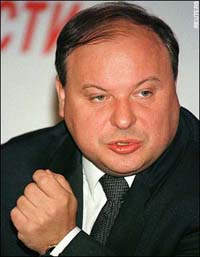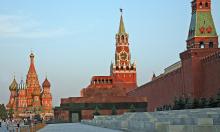Aide says doctors suspect former Russian Premier Yegor Gaidar was poisoned
Doctors treating former Russian Prime Minister Yegor Gaidar believe he was poisoned, an aide said Thursday.

Gaidar, 50, who served briefly as prime minister in the 1990s under President Boris Yeltsin and is one of the leaders of a liberal opposition party, began vomiting and fainted during a conference in Ireland on Nov. 24 the day after former KGB agent Alexander Litvinenko died in London. Gaidar, who was initially taken to an intensive care unit at an Irish hospital, is now recovering in a Moscow hospital.
"Doctors don't see a natural reason for the poisoning and they have not been able to detect any natural substance known to them" in Gaidar's body, spokesman Valery Natarov said. "So obviously we're talking about poisoning (and) it was not natural poisoning."
Doctors in Ireland initially suspected Gaidar's diabetes or some sort of ailment caused his illness. A spokesman for the Irish Department of Foreign Affairs, speaking on customary condition of anonymity, said Wednesday that authorities had "received no evidence of anything untoward about this."
Natarov said Gaidar was feeling better Thursday. "His condition is stable and improving. Doctors say there is no threat to his life at the moment."
Gaidar's daughter, Maria, said President Vladimir Putin had called her father on the phone to inquire about his health and wish him a smooth recovery.
Gaidar's illness has added to growing speculation in Moscow over Litvinenko's death and who might be responsible, with the Kremlin and its backers pointing to a plot targeting Putin's government and some critics seeing the hand of hard-liners in the country's ruling elite.
High doses of polonium-210 a rare radioactive element usually made in specialized nuclear facilities were found in Litvinenko's body after his death. Investigators are now checking places visited by the former spy and others who had contact with him in the weeks before he fell ill on Nov. 1.
Another former KGB spy who met with Litvinenko on the day he was allegedly poisoned, Andrei Lugovoy, once served as Gaidar's bodyguard.
Anatoly Chubais, a top Yeltsin-era government official and now head of the national electricity monopoly, said Wednesday he suspected a link between Gaidar's illness, Litvinenko's death and last month's murder of Russian investigative reporter Anna Politkovskaya.
While Gaidar's daughter is more critical of the Kremlin than her father, she ruled out that suggestions that Putin or his government were involved in his illness, and it could have been masterminded by forces seeking to discredit Putin.
"I am absolutely sure that it is something that could not have been done by Putin, by official sources, by somebody related with the official authorities in Russia," Gaidar, who heads a liberal youth movement, told the British Broadcasting Corp.
"It could have been (in the) interest ... (of) some people who are fighting against Putin and who want destabilization in the country," she said.
Gaidar, a liberal economist whose criticism of the Kremlin is largely limited to economic issues, served in post-Soviet Russia's most liberal and democratically oriented government. While he is one of the leaders of a liberal political party, liberals have been severely sidelined under Putin and he is not prominent, reports AP.
Gaidar is unpopular among many Russians who blame the liberal, Western-backed economic policies he pursued as prime minister for the decline in their living standards following the Soviet collapse.
Subscribe to Pravda.Ru Telegram channel, Facebook, RSS!




